最新外研版八年级英语上册Module 11教案
Module单元教学设计外研版八年级英语上册

八年级上册Module11单元教学设计单元主题单元主题Way of life 主题范畴人与社会学习目标课标摘录:义务教育《英语课程标准》语言技能三级标准(8年级):理解性技能:1.获取和梳理口语语篇的主旨要义和关键细节;2.梳理书面语篇的脉络、梗概和发展变化,提取关键信息,归纳内容要点;3.识别和判断书面语篇中上下文之间的逻辑关系。
表达性技能:4.正确、流利地朗读短文,有逻辑地讲述短文主要内容;5.在特定的情境中引出主题,并用所学语言与他人进行口头交流,有效询问,恰当表达,完成交际任务;6.在口头表达中结合主题使用正确的词汇、句式和语法,表意准确、得体。
课标分解:1.能通过听对话,选择或说出对话的主题、记录习俗差异等关键信息,并加以交流;2.能通过阅读对话,找出对话中的具体的生日、节日中西方不同的描述性信息;能选出或说出对话的主要内容;3.能在语境中猜出生词的意思,不妨碍听和阅读的理解;4.能通过读文章,能找出文章的主要大意。
5.能通过阅读文章,采用不同的阅读策略,抓住关键信息,理解课文,能在语境中猜出生词的意思,不妨碍听和阅读的理解。
6. 正确使用情态动词must, mustn’t, can/can’t, need/needn’t等谈论某地的风俗习惯。
教材分析:本模块主要围绕“生活方式”展开话题;本课从“英国生活方式”的角度展开,呈现了英国的文化习俗。
在谈论有关生活方式的话题基础上,促进学生对英国文化习俗的了解,让学生增强文化意识,学会尊重其他国家的传统习俗和生活方式。
学情分析:已知:学生在学习英语的过程中已经接触了一些中西方文化差异,对中西方文化差异有一定的认识和积累例如在七年级已经学习了在生日时候,如何选择礼物。
未知:学生对西方文化习俗的理解不够深入,对中西方不同文化进行对比的意识还比较薄弱。
措施:学生渴望了解更多的与生活相关的西方的文化习俗,就这一点来说,学生有较强的学习内驱力。
因此运用所学语言去进行跨文化交际的能力有待提高,这正好构成了本节课“教”和“学”的需求。
外研版八年级英语上册教案 Moddule 11 Unit 2

Module 11 Way of lifeUnit 2 In England, you usually drink tea with milk.一、教学目标1. 掌握词汇:eeone, for the first time, sandwich, gentleman, shoulder2. 掌握句型:(1) For eust say Mr or Mrs when you meet someone for the first time.(2) You can buy it and eat it in special fish and chip shops on the high street, or you can take it away and eat it with your fingers!(3) At the bus stop you must not push your way onto the bus.3. 学习和运用表达“民俗风情”的词汇及情态动词。
4. 能够读懂关于英语传统生活习俗的文章。
5. 能够写出介绍中国习俗的活动。
6. 能够增强跨文化意识,培养文化包容心。
二、教学重点及难点重点:掌握本篇文章,并能正确朗读。
难点:在了解本段文章的基础上,可以写出介绍中国习俗的小作文。
三、教学准备1. 多媒体设备和课件;2. 设计课后巩固练习;3. 教学图片。
四、教学过程Step 1 Warming-up1. T shows some pictures about Chinese traditions and asks the Ss to watch and talk about them.2. T shows some Chinese traditions and asks Ss to read.【设计意图】通过展示中国传统风俗图片,吸引学生注意力,导入新课。
Step 2 Pre-reading1. T shows some pictures one by one and asks the class to watch and read the new words.【设计意图】通过看图片学单词,帮助学生理解和记忆新单词。
外研版英语八年级上册Module 11《Way of life》(Unit 2)教学设计

外研版英语八年级上册Module 11《Way of life》(Unit 2)教学设计一. 教材分析《Way of life》(Unit 2)是外研版英语八年级上册Module 11的一部分,主要介绍了不同人的生活状况。
本节课的主要内容包括一个关于不同国家人们生活状况的短文,以及相关的词汇和语法知识。
通过本节课的学习,学生可以了解不同国家人们的生活状况,提高他们的阅读理解能力,同时也可以扩展他们的词汇量和语法知识。
二. 学情分析八年级的学生已经具备了一定的英语基础,能够进行简单的英语交流。
但是,他们的阅读理解能力和词汇量还有待提高。
因此,在教学过程中,需要注重培养学生的阅读理解能力,同时也要注意扩展他们的词汇量和语法知识。
三. 教学目标1.能够理解并朗读课文,掌握课文中的主要词汇和语法知识。
2.能够通过阅读课文,了解不同国家人们的生活状况。
3.能够运用所学的词汇和语法知识,进行简单的英语交流。
四. 教学重难点1.词汇和语法知识的掌握。
2.阅读理解能力的培养。
五. 教学方法1.任务型教学法:通过设定各种任务,让学生在完成任务的过程中,自然地学习和掌握词汇和语法知识。
2.交际型教学法:通过模拟真实的交流场景,让学生在实际交流中,运用所学的词汇和语法知识。
3.情境教学法:通过设定各种生活情境,让学生在情境中,自然地学习和掌握词汇和语法知识。
六. 教学准备1.教材:外研版英语八年级上册Module 11《Way of life》(Unit 2)。
2.多媒体设备:电脑、投影仪等。
3.教学PPT:内容包括课文内容、词汇、语法知识等。
七. 教学过程1.导入(5分钟)通过提问方式,引导学生谈论他们所知道的不同国家人们的生活状况。
例如:“Can you tell me what the life of students in Japan is like?” “What about in the United States?” 通过这样的导入,可以激发学生的兴趣,同时也可以帮助他们回忆起已知的知识。
外研版初中英语八年级上册《Module 11》模块教学设计(含课时设计)

4)You needn’t wait.
5)pay much attention to …
6) you mustn’t break anything.
7) You must only use ted paper forhongbaobecause red means luck.
句型结构:… you must say Mr or Mrs when you meet someone for the first time.
You can buy it and eat it in special fish and chip shops on the high street,
or you can take it away and eat it with your fingers!
and solve together.
6. Read.
Have the students read together.
8.
学习对话,让学生理解对话内容。
通过听力训练,让学生熟悉新单词和短语。
为进一步的听说学习做好铺垫。
让学生带着任务(问题)去听对话并找到答案,有助于培养和提高学生更加准确地听取信息的能力。通过小组活动提高学生间的自主、合作学习,让学生充分地实践运用语言,并激发学生创造性思维的发展。
6. Read.
Have the students read together.
1. Listen and number the words as you hear them.
2. Finish Activity2.
3.The students watch carefully and find out the answer:
八年级英语上册 Module11 教案+辅教资料外研版

Module 11 Way of lifeUnit 1A: Here’s a birthday gift for you, Bob. I hope you accept it and love it.B: It’s a chess set. Thanks a lot, Jack.A: Here is a video game. Grace asked me to send it to you.B: What a surprise! Grace stopped playing games for a few months. She is more serious now and she likes making works of arts. For example, she can make cloth toys, paper caps and wood chopsticks.A: No surprise. Grace knows you are interested in games.B: That’s true. Look! Here is a box of chocolate. Shall we open the box and taste it?A: Better not now. According to our tradition, you must not open these gifts immediately. You may open them after we leave.B: What a difference!A: …1. cap n.(有檐的)帽子2. chess n.国际象棋3. set n. (同类事物的)(一)套,(一)副,(一)组4. chopstick n.筷子5. toy n.玩具6. video adj.(电子)视频的【新义:n.录像】7. gift n.礼物【新义:n.天赋】8. surprise n.惊奇;意外之事v.使(某人)吃惊9. immediately adv.立刻;当即10. difference n.差别;差异11. accept v.收受;接受12. tradition n.传统习俗13. example n.例子;实例【新义:n.榜样】14. must v.aux. 必须;应该15. month n.月;月份16. serious adj.认真严肃的;不开玩笑的【新义:adj.严重的】17. taste v.有……的味道;n.味道;滋味【新义:n.吃(或喝)一小点;鉴赏力】1. surprise n.惊奇;意外之事v.使(某人)吃惊→surprised adj.惊奇的;惊讶的surprising adj.令人惊讶的2. immediate adj.立即的→immediately adv.立刻;当即3. different adj.不同的→difference n.差别;差异4. tradition n.传统习俗→traditional adj.传统的1. baseball cap棒球帽2. a chess set 一副国际象棋3. video game 电子游戏4. for example例如5. do some cleaning打扫卫生6. on the first day of the Spring Festival大年初一7. in the north of China在中国北方1. 这是给你的礼物。
外研版英语八年级上册:Module11 Unit 1-教案设计

Unit 1 In China, we open a gift later教材分析教学目标1. Ss master vo cab ula ry2. Ss can use them to talk about the way of life fluently.3. Ss respect and know about different cultures in differentcountries.教学重难点 1. Ss use language points to talk about their lives.教学过程我的修改Step 1 Lead-in : Warming up(复习旧识,营造氛围,导入新课) 1, Ss say something about their birthdays.2, Ss talk about what they usually do when they get presents.3, Ss guess what p eople in other countries usually do when they get presents.4, Ss listen and number the words as they hear them and then match them with the pictures.Step 2 The students can learn by themselves, and ask some questions about the study. (自主学习提出疑问)1. Listen to Part 3and find out the answers to the questions.2. Listen again and then check the true sentences.3. Listen and complete the table in Part4.4. Ss find out new words and language points.5. Ss help each other in groups.6. Ss read the dialogue aloud and practice it in pairs.7.Ss find out the sentences that have aux.v and understand their meanings. Step 3 The students can learn the main point with the help of the teacher, and solve the problems.(精讲点拨)1. Explain the following phrases to the Ss.both & all both … and…..We must use two hands when we get presents in China.All the children like birthday parties.pay attention to be interested in/ to do….for example & such as, do some cleaning on the first day of the Spring Festivaluse … to do / use… for… had better do / had better not do…2. Ss try to make up sentences with them.3. the use of can, need must.Step 4 Effective practice, consolidate the knowledge(训练巩固)1. Do Ex on PPT.2. Listen and check.3. Practice Every day English.4. Ss finish Part7,5. Ss try to find out different cultures in different countries.Step5 Summary evaluation, leak turnover(总结评价,查漏补缺) We should give the Ss more chances to train themselves.。
外研版八年级英语上册教案 Moddule 11 Unit 1
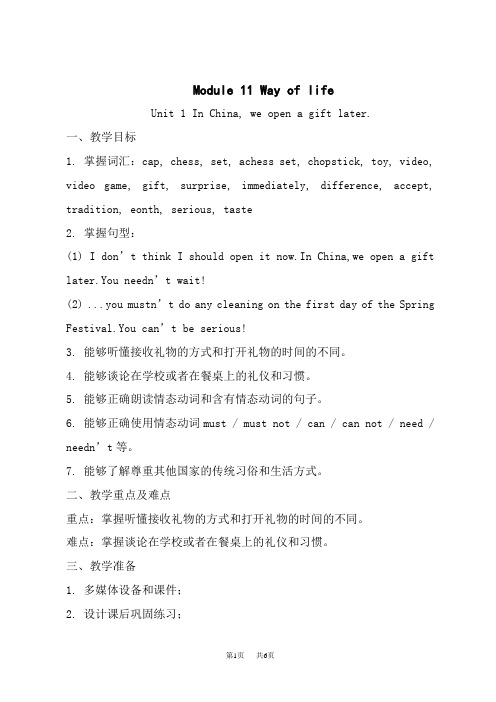
Module 11 Way of lifeUnit 1 In China, we open a gift later.一、教学目标1. 掌握词汇:cap, chess, set, achess set, chopstick, toy, video, video game, gift, surprise, immediately, difference, accept, tradition, eonth, serious, taste2. 掌握句型:(1) I don’t think I should open it now.In China,we open a gift later.You needn’t wait!(2) ...you mustn’t do any cleaning on the first day of the Spring Festival.You can’t be serious!3. 能够听懂接收礼物的方式和打开礼物的时间的不同。
4. 能够谈论在学校或者在餐桌上的礼仪和习惯。
5. 能够正确朗读情态动词和含有情态动词的句子。
6. 能够正确使用情态动词must / must not / can / can not / need / needn’t等。
7. 能够了解尊重其他国家的传统习俗和生活方式。
二、教学重点及难点重点:掌握听懂接收礼物的方式和打开礼物的时间的不同。
难点:掌握谈论在学校或者在餐桌上的礼仪和习惯。
三、教学准备1. 多媒体设备和课件;2. 设计课后巩固练习;3. 教学图片。
四、教学过程Step 1 Warming-upT shows some pictures to the class and asks them to watch. Then T and Ss make sentences with mustand mustn’t.【设计意图】通过看图片,结合图片内容用must和mustn’t造句,使学生自然地使用情态动词must,激发学生的兴趣,导入新课。
Module11Unit1教案2022-2023学年外研版八年级英语上册

(2)语法:一般现在时态,特别是第三人称单数的动词变化规则。教师应强调动词结尾加-s或-es的规则,以及不规则动词的变化。
举例:讲解动词变化规则,如:eat -> eats, go -> goes, be -> is等。
(3)对话:学会使用一般现在时态描述动物的特征和习性。教师需引导学生运用所学词汇和语法进行口语表达。
Module 11 Unit 1教案2022-2023学年外研版八年级英语上册
一、教学内容
《Module 11 Unit 1教案2022-2023学年外研版八年级英语上册》主要包括以下内容:
1.教材章节:Module 11 Unit 1
2.词汇:学习与描述动物相关的词汇,如giraffe、zebra、elephant等。
举例:设计情景对话,让学生模拟在动物园向他人介绍动物。
(4)阅读理解:理解关于动物园的文章,获取关键信息。教师应教授学生如何快速捕捉文章主题和细节信息。
举例:指导学生通过略读、寻读等阅读策略,提高阅读效率。
(5)写作:运用一般现在时态编写一段关于动物的描述。教师需教授写作技巧,帮助学生组织语言,表达清晰。
1.理论介绍:首先,我们要了解一般现在时态的基本概念。一般现在时态是描述经常发生的事情或描述事实的时态。它在日常交流中非常重要,帮助我们描述动物的特征和习性。
2.案例分析:接下来,我们来看一个具体的案例。这个案例展示了如何使用一般现在时态描述动物园中的动物,以及它如何帮助我们更好地了解动物。
3.重点难点解析:在讲授过程中,我会特别强调一般现在时态的动词变化规则,特别是第三人称单数的变化。对于难点部分,我会通过举例和比较来帮助大家理解。
外研版八年级英语上册教案 Moddule 11 Unit 3-2

Module 11 Way of lifeUnit 3 Language in use 2一、教学目标1. 能准确地发音和使用本模块的词汇。
2. 能够掌握本模块的重点句子。
3. 能够在Around the world的模块中,了解不同颜色鲜花的含义以及送花的禁忌。
4. 能够掌握情态动词must / must not / can / can not / need / needn’t 等的用法。
5. 能够通过本课的学习,提醒学生要尊重不同国家的风俗习惯,培养跨文化交际意识。
二、教学重点及难点重点:掌握本模块的词汇和短语。
难点:能够使用情态动词来表述某地的风俗习惯。
三、教学准备1. 多媒体设备和课件;2. 设计课后巩固练习;3. 教学图片。
四、教学过程Step 1RevisionDo some grammar exercises.Step 2 Pre-readingT asks Ss to make a fact book about cultures of English-speakingcountries.【设计意图】通过指导学生整理英语国家文化概况并写下他们发现的有趣的事情,从而引入后面的阅读内容。
Step 3 While-reading1.T lets Ss talk about the etiquette of sending flowers in the West.2. T and Ss read and learn Around the world together.3. T shows some questions to the class so that they can understand the passage better.(1)What does red rose stand for?(2)What does white flowers stand for in Greece?【设计意图】通过师生一起阅读文章,并由教师讲解其中的较难的句子,帮助学生理解文章内容。
外研版八年级英语上册教案 Module11 Unit1 (1)

8.(v. )拒绝→__________→(反义词)______________
9.重点及易错单词:
筷子(n.)→__________视频的(adj. )→___________惊奇;意外之事(n.)→_________立刻;当即(adv. ) → ______差别;差异(n.)→_________
2.通过对应填词,明确不同单词的词性:
Exercise
1. (n. )惊奇→ _______(v. )使...惊奇→__________→ (adj. )感到惊讶的_________→(adj. )令人惊讶的________
→使某人惊讶的是___________________________
2. (adv. )立刻→ ____________ (同义词组)_____________
关于常见礼物的名词,学生在之前已经掌握。
(2)未学知识
词汇:n. surprise, difference, tradition,
v. accept, must, taste
adj. serious
Adv. Immediately
词组:for example
句型:I don’t think I should open it now.(think句型否定前置)
adj. serious
Adv. Immediately,
词组:for example
语法: I don’t think I should open it now.
You needn’t wait.
You mustn’t break anything.
外研版英语八年级上册单元教案-Module11
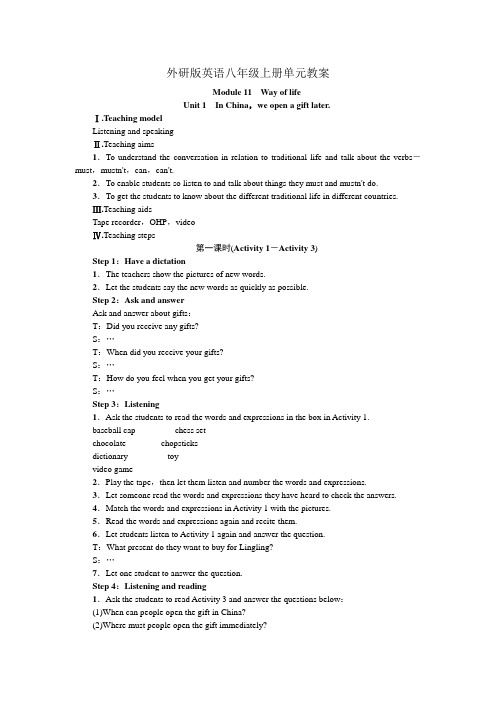
外研版英语八年级上册单元教案Module 11Way of lifeUnit 1In China,we open a gift later.Ⅰ.Teaching modelListening and speakingⅡ.Teaching aims1.To understand the conversation in relation to traditional life and talk about the verbs-must,mustn't,can,can't.2.To enable students so listen to and talk about things they must and mustn't do.3.To get the students to know about the different traditional life in different countries.Ⅲ.Teaching aidsTape recorder,OHP,videoⅣ.Teaching steps第一课时(Activity 1-Activity 3)Step 1:Have a dictation1.The teachers show the pictures of new words.2.Let the students say the new words as quickly as possible.Step 2:Ask and answerAsk and answer about gifts:T:Did you receive any gifts?S:…T:When did you receive your gifts?S:…T:How do you feel when you get your gifts?S:…Step 3:Listening1.Ask the students to read the words and expressions in the box in Activity 1.baseball cap ________ chess set________chocolate________chopsticks ________dictionary ________ toy ________video game ________2.Play the tape,then let them listen and number the words and expressions.3.Let someone read the words and expressions they have heard to check the answers.4.Match the words and expressions in Activity 1 with the pictures.5.Read the words and expressions again and recite them.6.Let students listen to Activity 1 again and answer the question.T:What present do they want to buy for Lingling?S:…7.Let one student to answer the question.Step 4:Listening and reading1.Ask the students to read Activity 3 and answer the questions below:(1)When can people open the gift in China?(2)Where must people open the gift immediately?(3)Do people accept a gift with both hands in the West?2.Let them show their answers.3.Read the conversation again and check what you usually do in China.(1)Open a present immediately when you receive it.(2)Accept a present with both hands.(3)Use red paper for hongbao.(4)Do cleaning on the first day of the Spring Festival.(5)Break something during the Spring Festival.(6)Have your hair cut during the Spring Festival month.4.Play the tape,and let students listen and repeat after the tape.5.Let some students act out the conversation.6.The teacher explains some difficulties to them.Step 5:Everyday EnglishOh,you remembered!What a surprise!It's bad luck!You can't be serious!Perfect!Step 6:Homework1.Learn the new words by heart.2.Act out the conversation in groups.3.Finish off the workbook exercises.Blackboard DesignUnit 1In China,we open a gift later.Key vocaulary:immediately adv.立即;直接地surprise n.&v.表示“惊奇,意外之事”;使(某人)吃惊Key structures:do some+v.-ing:do some cleaningdo some shoppingdo some cookingpay attention toon the first day of…have your hair cut(have sth.done)第二课时(Activity 4-Activity 7)Step 1:Have a dictationGet the students to write the words and phrases in Unit 1,then check the answers to see if they have grasped the usages of the points.Step 2:Practice1.Read the conversation in Activity 3 again.2.Complete the passage with the words in the box.accept,attention,surprise,taste,traditionsIt is always a(n) (1)________to receive gifts from family members and friends.In China,weusually (2)________ a gift with both hands and open it later.But in the West,people usually do not pay much (3)________ to that.During the Spring Festival,there are many (4)________.For example,people in the north of China eat lots of jiaozi.They (5)________ great.3.Let someone read the passage to check the answers.Step 3:Pronunciation1.Read the sentences in Activity 5,and predict how the speaker will pronounce the underlined words.(1)I don't think I should open it now.(2)You needn't wait!(3)You mustn't break anything.(4)You must only use red paper for hongbao.(5)You'd_better_not have your hair cut during the Spring Festival month.2.Play the tape and let them listen and check.3.Read the sentences in Activity 5 aloud.Step 4:Speaking3.Share the ideas with the class.Step 5:Homework1.Revise all the check points in this unit.2.Finish off the workbook exercises.Blackboard DesignUnit 1In China,we open a gift later.Answers to Activity 4:(1)surprise(2)accept(3)attention(4)traditions(5)tasteKey structures:We must…at school/the dining table.We mustn't…at school/the dining table.We can't…at school/the dining table.Unit 2In England,you usually drink tea with milk.Ⅰ.Teaching modelReading and writingⅡ.Teaching aims1.To extract the specific information from the reading passage.2.To write about customs in your hometown.3.To know about different traditions in different cultures.Ⅲ.Teaching aidsTape recorder,OHP,videoⅣ.Teaching steps第一课时(Activity 1-Activity 2)Step 1:Have a dictation1.Show two pictures of English customs.2.Let students work in pairs and talk freely according to the pictures.Step 2:Pre-reading1.Show some pictures of new words.2.Teach and explain the new words before reading.3.Give the question to the students before the reading:Which sentences describe what you can see in the pictures in Activity 1?Step 3:Reading1.Get the students to read the passage once or twice quickly,and after that ask them to answer the question.2.Get the class to read the passage again,but this time read it more slowly.Then ask them to underline the difficult points in the passage.3.The teacher explains some difficult points to the students.4.Play the tape,then let them listen and read after it.5.Have a reading competition.Step 4:Explain1.Show the key points:(1)notice sb.do sth.注意到某人做过某事notice sb.doing sth.注意到某人正在做某事(2)for example:比如,例如(后面可接句子)such as:比如,例如(后面可接名词、代词、动名词,不可接句子)(3)take away 带走(当宾语为代词时要放在take和away的中间)(4)need to do sth.需要做某事(5)must (情态动词)必须must后面接动词原形,当用must提问时,肯定回答为Yes,sb. must.否定回答为No,sb. needn't.2.Let the students master the key points.Step 5:Homework1.Read the words and the passage frequently.2.Copy the words and expressions.3.Finish some exercises in workbook.Blackboard DesignUnit 2In England,you usually drink tea with milk.notice sb.do sth.注意某人做过某事notice sb.doing sth.注意某人正在做某事for example 比如,例如try to do sth.努力做某事try doing sth.尝试做某事take away 带走need to do sth.需要做某事each other 互相第二课时(Activity 3-Activity 6)Step 1:Review1.Read the passage in Activity 2 again.2.Read the words and expressions in Activity 4:for the first time,meal,meet,something interesting,stand in a line,take away3.Use them to answer the following questions:(1)What did Wang Hui notice when he was in England?(2)What is one example of the English way of life?(3)What did you eat for afternoon tea?(4)How can you eat fish and chips?(5)What do people do when they wait for the bus?4.Share their answers with the class.Step 2:Have a dictationGet the students to write the words and phrases in Unit 2,then check the answers to see if they have grasped the usages of the points.Step 3:Practice1.Read the passage in Activity 2 again.2.Choose the correct answers for the sentences.3.Check the answers for the whole class.Step 4:Writing1.Answer the questions about ways of life in their home town.(1)What do you do when you meet people for the first time?(2)What must you say when you talk to older people?(3)What food and drink do you give to visitors when they come to your home?(4)What do you eat during the Spring Festival?2.Write a passage about ways of life in their home e your answers to the questions in Activity 5 to help them.3.Share their passages with the class.Step 5:Homework1.Revise all the key points in this unit.2.Finish the writing.3.Finish off the workbook exercises.Blackboard DesignUnit 2In England,you usually drink tea with milk.Key vocabulary:for the first time,meal,meet,something interesting,stand in a lineAnswers to Activity 4:(1)He noticed something interesting with the English way of life.(2)You must say Mr or Mrs when you meet someone for the first time.(3)We ate sandwiches and a large fruit cake.(4)We can buy it and eat it in special fish and chip shop on the high street,or take it away and eat it with our fingers.(5)They stand in line and wait for their turn.Unit 3Language in useⅠ.Teaching modelRevision and applicationⅡ.Teaching aims1.To revise the words and expressions in this module.2.To learn to use can,can't,must,mustn't,need and needn't.3.To learn about the differences between Chinese and western traditions. Ⅲ.Teaching aidsTape recorder,OHP,videoⅣ.Teaching steps第一课时(Activity 1-Activity 6)Step 1:ReviewRevise the usages of can,can't,must,mustn't,need and needn't.Step 2:Language practice1.Fill in the blanks with proper modal verbs:(1)You________ say Mr or Mrs when you meet someone for the first time.(2)You________ take it away.(3)You________ break anything.(4)You________ wait!2.Read the sentences and check the answer.Step 3:Grammar PracticeAsk students to finish some exercises of the usages of modal verbs. 1.Complete the conversation in Activity 1 with can or can't.2.Check the answers and act out the conversations.3.Complete the school rules in Activity 2 with must or must not.4.Let students read the rules and check the answers.5.Read the passage in Activity 3.6.Choose and underline the correct words to complete the passage. 7.Read the passage again and check the answers.Step 4:Listening1.Look at the pictures in Activity 4 carefully.2.Play the tape and let the students check the things he must or mustn't do.(1)clean up bedroom once a week(2)wash up after dinner(3)stay out after 9 pm(4)do homework before going out(5)wash hands before dinner(6)play music loudly after 10 pm3.Let students say their answers like this:He must clean up bedroom once a week.…He mustn't…4.Play the tape again and list what he can't do like this:He can't stay out after 9 pm.He can't…5.Read the listening material after the tape.Step 5:Pair work1.Write some things they can,must and must not do at home.For example:I can…I must…I must not…2.Work in pairs.Tell each other three things they must do at home and three things they mustn't do.For example:—I must visit my grandparents once a week.I mustn't stay up late in the evening.—…Step 6:Homework1.Revise all the key points in this Module.2.Finish off the workbook exercises.Blackboard DesignUnit 3Language in useHe must clean up bedroom once a week.…He mustn't…He can't stay out after 9 pm.He can't…I can…I must…I must not…—I must visit my grandparents once a week.I mustn't stay up late in the evening.—…第二课时(Activity 7-Activity 12)Step 1:Word and expression practice1.Read the words and expressions in the box in Activity 7.baseball cap,chess set,chopsticks,dictionary,presents 2.Complete the sentences with the words or expressions.(1)Use your ________to look up any words you do not understand.(2)Most Chinese people eat noodles with ________.(3)Jenny could not wait to open her birthday________.(4)He thinks it is cool to wear his ________ back-to-front.(5)Where is my________?Let's play a game.3.Read out the sentences and check the answers.4.Play a game.Read the words and expressions in the box first.baseball cap,bike,chess set,chocolate,chopsticks,dictionary,fish and chips,litter,photo,video game5.Choose a word or an expression from the box and describe it to the class.The class guesses what it is.For example:A:Many people have one.B:Is it a chess set?A:No.You use it to get to places.C:Is it a bike?A:Yes.6.Let some students play the game one by one.Step 2:Around the worldTraditional presents1.Get the students to read this passage.Before reading,teach them the key words and phrases.2.Then ask a few students to read it,and translate it into Chinese at last.3.Solve the problems which the students meet in reading.Step 3:WritingGiving advice to foreign guests who are visiting a Chinese family.1.Write some advice for foreign visitors to a Chinese family.Think about the following questions:must they wear?mustn't they talk about?can't they do?presents can they bring?must they arrive?2.Divide the students into groups.Let them show the advice they wrote in Activity 9 to their group members.Choose two best pieces of advice.3.Let them show the advice their group chose in Activity 10 to the whole class.Put the pieces of advice together to form the advice of the whole class.4.Ask them to send the advice of the whole class to their foreign friends or post it on their class blog.Step 4:Homework1.Finish the workbook in this module.2.Revise the whole module.Blackboard DesignUnit 3Language in useAnswers to Activity 7:(1)dictionary(2)chopsticks(3)presents(4)baseball(5)chess setA:Many people have one.B:Is it a chess set?A:No.You use it to get to places.C:Is it a bike?A:Yes.。
外研版八年级上册(新)英语教案Module11Wayoflife教案
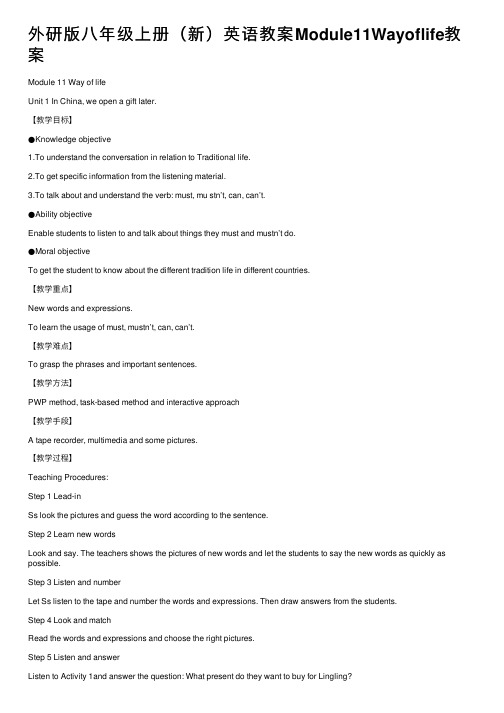
外研版⼋年级上册(新)英语教案Module11Wayoflife教案Module 11 Way of lifeUnit 1 In China, we open a gift later.【教学⽬标】●Knowledge objective1.To understand the conversation in relation to Traditional life.2.To get specific information from the listening material.3.To talk about and understand the verb: must, mu stn’t, can, can’t.●Ability objectiveEnable students to listen to and talk about things they must and mustn’t do.●Moral objectiveTo get the student to know about the different tradition life in different countries.【教学重点】New words and expressions.To learn the usage of must, mustn’t, can, can’t.【教学难点】To grasp the phrases and important sentences.【教学⽅法】PWP method, task-based method and interactive approach【教学⼿段】A tape recorder, multimedia and some pictures.【教学过程】Teaching Procedures:Step 1 Lead-inSs look the pictures and guess the word according to the sentence.Step 2 Learn new wordsLook and say. The teachers shows the pictures of new words and let the students to say the new words as quickly as possible.Step 3 Listen and numberLet Ss listen to the tape and number the words and expressions. Then draw answers from the students.Step 4 Look and matchRead the words and expressions and choose the right pictures.Step 5 Listen and answerListen to Activity 1and answer the question: What present do they want to buy for Lingling?Step 6 Read the dialogue and answer the questions1.When can people open the present in China?2.Where must people open the present immediately?3.Do people accept a present with both hands in the West?Step 7 Now check (√) what you usually do in China1. Open a present immediately when you receive it.2. Accept a present with both hands.3. Use red paper for hongbao.4. Do cleaning on the first day of the Spring Festival.5. Break something during the Spring Festival.6. Have your hair cut during the Spring Festival month.Step 8 Complete the passageRead the passage and fill in the blanks with the correct form of the words.accept attention surprise taste traditionsIt is always a(n) (1) ________ to receive gifts from family members and friends. In China, we usually (2) _______ a gift with both hands and open it later. But in theWest, people usually do not pay much (3) __________ to that. During the Spring Festival, there are many (4) _________. For example, people in the north of China eat lots of jiaozi. They (5) _______ great.Step 9 Everyday EnglishOh, you remembered!What a surprise!It’s a bad luck!You can’t be serious!Perfect!Step 10 Language point1. What’s a surprise!surprise表⽰“惊奇,意外之事”。
外研版八年级英语上册Module 11 unit3 Language in use.教案 (2)
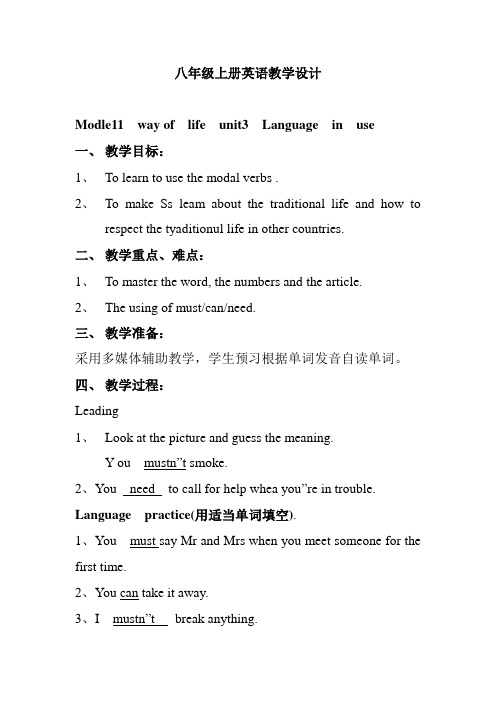
红楼梦读后感字数100字优秀5篇(经典版)编制人:__________________审核人:__________________审批人:__________________编制单位:__________________编制时间:____年____月____日序言下载提示:该文档是本店铺精心编制而成的,希望大家下载后,能够帮助大家解决实际问题。
文档下载后可定制修改,请根据实际需要进行调整和使用,谢谢!并且,本店铺为大家提供各种类型的经典范文,如工作资料、求职资料、报告大全、方案大全、合同协议、条据文书、教学资料、教案设计、作文大全、其他范文等等,想了解不同范文格式和写法,敬请关注!Download tips: This document is carefully compiled by this editor. I hope that after you download it, it can help you solve practical problems. The document can be customized and modified after downloading, please adjust and use it according to actual needs, thank you!In addition, this shop provides you with various types of classic model essays, such as work materials, job search materials, report encyclopedia, scheme encyclopedia, contract agreements, documents, teaching materials, teaching plan design, composition encyclopedia, other model essays, etc. if you want to understand different model essay formats and writing methods, please pay attention!红楼梦读后感字数100字优秀5篇如果让你写一篇红楼梦读后感,你知道怎么写吗?《红楼梦》反映了复杂的社会问题。
最新外研版八年级上册《module 11 unit 1 it may be cold tomorrow》教案.doc

Module 11 The weatherUnit 1 It may be cold tomorrow.[Teaching Form]Listening and speaking[Teaching Method]Bottom-up approach[Teaching Objective]To consolidate the words about the weather.To understand conversations about the weather.To get specific information from the listening material.[Teaching Points]Key vocabulary: cloud(y), rain(y), s hower(y), snow(y), storm(y), sun(ny), wind(y),wet, dry, cool, cold, degree, temperature, might, probablyKey structures: What’s the weather like? / How’s the weather?It’s ……. / Will it be …….?It may not even be… / It might be… / It’ll probably be... When’s the best time t o visit…? When it’s not too…or too... [Teaching Aids]Blackboard, mini-b oard, pictures, tape recorder[Teaching Contents]Ⅰ Greeting:Say hello to each other, have a daily report.Ⅱ Revision: Finish the following sentences1. The t emperature is between 10 and 18 d egrees .2. It’s w indy and c loud today, it makes me feel sad.3. We had a picnic on a s unny Sunday.4. Take a rain coat with you, it’ll be w et and s howery this afternoon.6. The weather is d ry and c ool in fall.5. Don’t angry, he’s only j oking .Ⅲ Warming-up1. Show the word “weather”, say “Can you give me some words about it?” warm hot cool cold freezingcloud snow showers storm wind2. Show some pictures, ask and answer (change the n. into the adj.): What’s the weather like? How’s the weather?It’s sunny. It’s rainy.cloudy showerywindy stormysnowy3. Have the students listen to me and check the table.Good morning, here’s the weather forecast for Shantou today. It’ll be sunny and warm in the morning. And the temperature will be between 20 and 26 degrees. Because of the cold current, in the afternoon it’ll be windy and showery with the temperature of between 12 and 18. So p lease remember to take a warm coat with you. Thanks for listening.ATUREⅣ Presentation (Activity 4 5 6)1. Listen to Activity 4 and answer the two questions.Q1: What are they talking about?Q2: How many places are they talking about?2. Listen again and fill in the table. (Activity 5)Beijing3. Repeat after the tape.4. Finish Activity 6, correct the sentences.5. Read the conversation together.Ⅵ Summary: How to talk about the weather?(from Activity 4)1. Ask: What will the weather be like?When’s the best time to visit...?2. Answer: It’s..., isn’t it? / Will it be …….?It may not even be… / It might be… / It’ll prob ably be... When it’s not too…or too...Ⅶ Consolidation1. Read and spell the words again2. Read the key sentences togetherⅧ Homework1. Copy the sentences about the weather2. Finish Workbook Act.23. Prepare for the new lesson。
外研版-英语-八上- Module11 Unit3教学设计
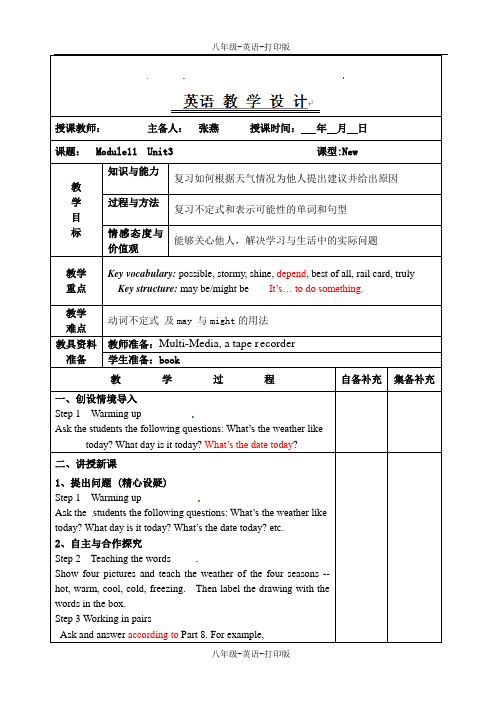
授课教师:主备人:张燕授课时间:年月日课题: Module11 Unit3 课型:New教学目标知识与能力复习如何根据天气情况为他人提出建议并给出原因过程与方法复习不定式和表示可能性的单词和句型情感态度与价值观能够关心他人,解决学习与生活中的实际问题教学重点Key vocabulary:possible, stormy, shine, depend, best of all, rail card, truly Key structure:may be/might be It’s… to do something.教学难点动词不定式及may 与might的用法教具资料准备教师准备:Multi-Media, a tape r ecorder学生准备:book教学过程自备补充集备补充一、创设情境导入Step 1 Warming upAsk the students the following questions: What’s the weather like today? What day is it today? What’s the date today?二、讲授新课1、提出问题 (精心设疑)Step 1 Warming upAsk the students the following questions: What’s the weather like today? What day is it today? What’s the date today? etc.2、自主与合作探究Step 2 Teaching the wordsShow four pictures and teach the weather of the four seasons -- hot, warm, cool, cold, freezing. Then label the drawing with the words in the box.Step 3 Working in pairsAsk and answer according to Part 8. For example,-- What’s the temperature? -- It’s 20 degrees. It’s warm.-- What’s the weather like? -- It’s warm and wet.Step 4 Asking and answeringLook at the pictures and answer the questions: How many seasons/months are there in a year? What are they?Step 5 Listening1. Listen and choose the correct months.2. Listen again and check (√) the true sentences.3、师生共议探究归纳Get the students to have a look at the following sentences.It’s very di fficult to depend on the weather in Britain because it changes a lot.It doesn’t snow very often but people always hope it’ll snow at Christmas. So I think it’s very nice to snow at Christmas.4.巩固应用、解决问题Complete the sentences with the correct form of the words in the box (bring, go, see, swim, visit, wear).Get the students to make sentences in their own words. Compared with the words may, might, possible, probably and possibly.Acc ording to the sentence It’s great fun to play this game. But it may be dangerous to play it. Get the students to complete Part 5. 5.知识小结与归纳Look at the picture and read the passage The wettest place. Get the students to guess or look up the new words by themselves and learn much more knowledge around the world.Homework1. Write a message to a friend who wants to visit China.2. Workbook, Pages 154-155, Reading and writing & Self-assessment.板书设计Module 11 Unit 3New words: Important structures :。
外研版英语八年级上册Module 11Module 11教案与反思牛老师

Module 11 Way of life 人非圣贤,孰能无过?过而能改,善莫大焉。
《左传》江缘学校陈思梅知识目标Unit 1重点单词cap, chess, set, chopstick, toy, video, gift,surprise,immediately, difference, accept,tradition, example, must,month, serious,taste重点短语a chess set, video game, for example, do somecleaning,on the first day of, bad luck, haveone's hair cut重点句子1.I don't think I should open it now.2.I'm interested to know all the Chinesetraditions.3.And you mustn't break anything .4.And you'd better not have your hair cutduring the Spring Festival month.Unit 2重点单词experience, stay, someone, sandwich,gentleman, shoulder重点短语for the first time, fish and chips, a lightmeal, take away,stand in a line重点句子1.For example, you must say Mr or Mrs when youmeet someone for the first time.2.Afternoon tea is not just a drink but a lightmeal at around 4 pm.3.At the bus stop, you must not push your wayonto the bus.【素材积累】宋庆龄自1913年开始追随孙中山,致力于中国革命事业,谋求中华民族独立解放。
外研版英语八年级上册教案:module11 unit1(初二上

能够听取信息,训练和培养学生细节听力技巧
Step 4
Post-task
(8ˊ)
1.Enable the Ss retell the conversation as a short passage with the information above. Then ask some Ss to retell.
教材分析
本课处于英语《新标准》八年级上册模块11第一单元的第一课时。本模块以天气为话题,本单元把焦点放在对天气的介绍上,话题贴近学生生活;学生也比较感兴趣,便于开展活动。重点学习和天气有关的词汇以及情态动词may, might和副词probably表示可能性的用法。本节教学内容有助于提高学生综合英语运用的能力.
渲染气氛,导入新课
Step 2 Pre-task
(9ˊ)
1. Words learning. Show the Ss some pictures and let them say it quickly.
2. Give words such as:cloud﹑snow﹑rain﹑Letˊs see“Who can say more adjective about weather”?
利用图片学习新单词,再通过看谁说的越多天气的形容词训练新单词
训练学生听懂天气预报,培养学生细节听力的技巧
Step 3
While-task
(25ˊ)
1. Play the tape
2. Organize them to check their answers in pairs .
3. Organize the Ss work in group of 3to read the conversation. Then complete the table in〈学案〉125.Task3
- 1、下载文档前请自行甄别文档内容的完整性,平台不提供额外的编辑、内容补充、找答案等附加服务。
- 2、"仅部分预览"的文档,不可在线预览部分如存在完整性等问题,可反馈申请退款(可完整预览的文档不适用该条件!)。
- 3、如文档侵犯您的权益,请联系客服反馈,我们会尽快为您处理(人工客服工作时间:9:00-18:30)。
tape recorder
课时
2
教学过程
Step1 Warming-up
1. Review the text of Unit 1.
2.Some sentences about the weather.
Step 2Reading
1. Read Learning to learn.
2. Read the passage and decide what you can see in the photos in Activity 1.
To match advice and reasons
To write advice using because , so and but
教学重点
Key vocabulary : camera , umbrella , pleasant , from time to time , fall
教学难点
To write advice using because , so and but
3. Work in pairs. Say what the weather might or might not be like.
tomorrow next week next month
It’ll probably be cold tomorrow.
Step 5 Pronunciation
1. Listen to the speaker showing surprise in Activity 7.
个人修改
板书设计
课后评价
课题
Module 11 Unit 2
When’s the best time to visit your town or country?
课型
Readingand writing
教学目标
To get information from the reading material about the best time to visit theUSA
教学难点
To talk about possibilities
教具
Video, Tape recorder
课时
2
教学过程
Step1 Warming-up
1. Read the words in Unit 1.
2. Match the words with the symbols in the table in Activity 1 .
7. be off to sp.
Step 4 Exercise
1. Complete the table with the weather forecast for Spring Festival in Activity 5.
2. Check the true the sentences in Activity 6.
2. Listen and write *if the speaker is asking a question or **if he is showing surprise.
3.Say the sentences aloud.
Step 6 Exercise
Finish the exercise in the workbook Ex. 1.
2. Will it be snowy?
3. It may not even be cold, just wet.
4. It might be windy.
5. What will the weather be like? Not bad.
6. it’ll probable be hot and sunny/dry.
3. Play the tape and ask the students to listen carefully.
课题
Module 11 Unit 1
It may be cold tomorrow.
课型
Listening and speaking
教学目标
1. To understand the conversation about weather
2. To get specific information from the listening material
3. Listen to the weather forecast and check the correct information in the table in Activity 2.
4. Work in pairs. Correct the wrong information in the table in Activity 3.
3. Play the recording and have them read and follow.
4. Act it out.
5. Learn Everyday English.
Step 3 Explain the important and difficult points
1. It’s freezing, isn’t it?
2. Key structures: It may not even be cold , just wet .
And irobably be hot and sunny.
It may be quite cool, but it’ll probably be dry.
Step 2 Listen and read ( Activity 4 )
1. Play the tape and ask the students to listen carefully.
2. Ask the students to read through the conversation individually.
3. To talk about possibilities
教学重点
1. Key vocabulary: cloud , shower , degree , temperature , joke , wet , might , windy , probably , sunny , cool , dry , cloudy
